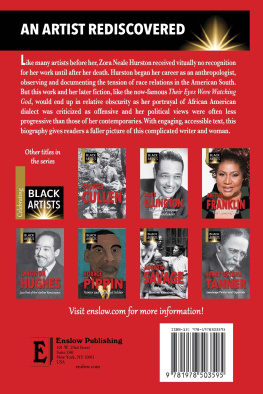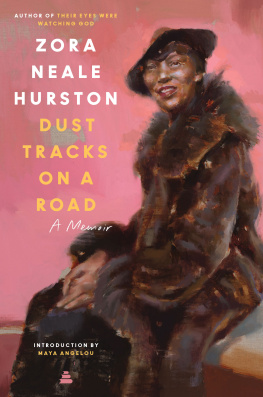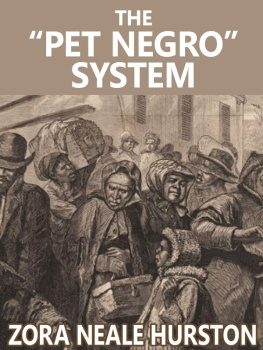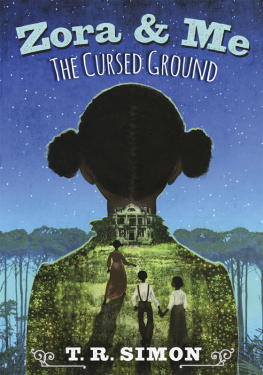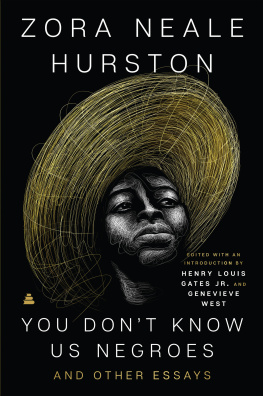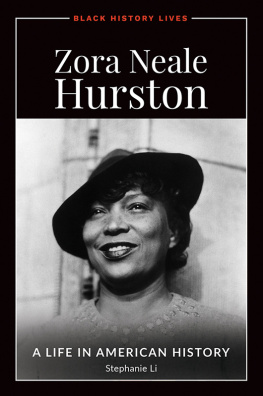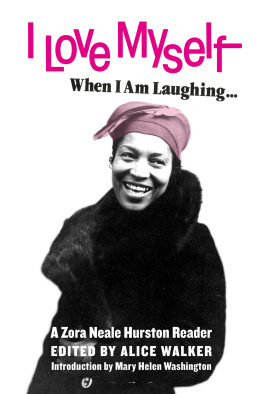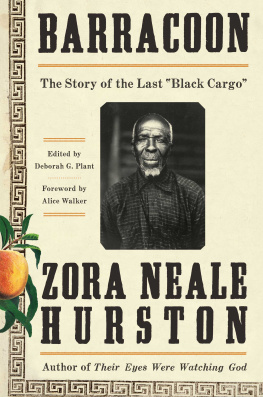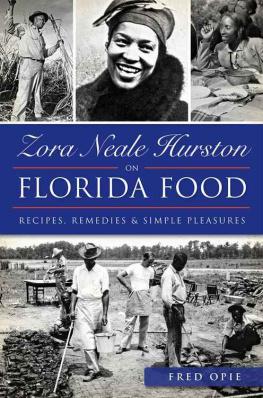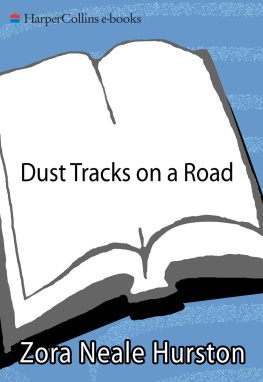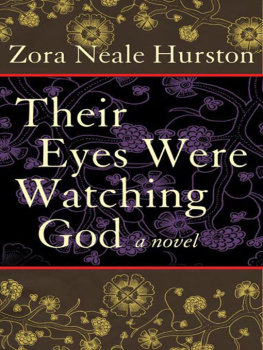Zora Neale Hurston (author) - Every Tongue Got to Confess: Negro Folk-tales from the Gulf States
Here you can read online Zora Neale Hurston (author) - Every Tongue Got to Confess: Negro Folk-tales from the Gulf States full text of the book (entire story) in english for free. Download pdf and epub, get meaning, cover and reviews about this ebook. year: 2002, publisher: Perennial, genre: Detective and thriller. Description of the work, (preface) as well as reviews are available. Best literature library LitArk.com created for fans of good reading and offers a wide selection of genres:
Romance novel
Science fiction
Adventure
Detective
Science
History
Home and family
Prose
Art
Politics
Computer
Non-fiction
Religion
Business
Children
Humor
Choose a favorite category and find really read worthwhile books. Enjoy immersion in the world of imagination, feel the emotions of the characters or learn something new for yourself, make an fascinating discovery.

- Book:Every Tongue Got to Confess: Negro Folk-tales from the Gulf States
- Author:
- Publisher:Perennial
- Genre:
- Year:2002
- Rating:3 / 5
- Favourites:Add to favourites
- Your mark:
- 60
- 1
- 2
- 3
- 4
- 5
Every Tongue Got to Confess: Negro Folk-tales from the Gulf States: summary, description and annotation
We offer to read an annotation, description, summary or preface (depends on what the author of the book "Every Tongue Got to Confess: Negro Folk-tales from the Gulf States" wrote himself). If you haven't found the necessary information about the book — write in the comments, we will try to find it.
Every Tongue Got to Confess: Negro Folk-tales from the Gulf States — read online for free the complete book (whole text) full work
Below is the text of the book, divided by pages. System saving the place of the last page read, allows you to conveniently read the book "Every Tongue Got to Confess: Negro Folk-tales from the Gulf States" online for free, without having to search again every time where you left off. Put a bookmark, and you can go to the page where you finished reading at any time.
Font size:
Interval:
Bookmark:
Got to Confess
from the Gulf States
Foreword by
John Edgar Wideman
Edited and with an Introduction by
Carla Kaplan

The Oral Tradition: A Reading Group Guide Every Tongue Got to Confess
by John Edgar Wideman
by Carla Kaplan
Stories Kossula Told Me
The estate of Zora Neale Hurston is deeply grateful for the contributions of John Edgar Wideman and Dr. Carla Kaplan to this publishing event.
We also thank our editor Julia Serebrinsky, our publisher Cathy Hemming, our agent Victoria Sanders, and our attorney Robert Youdelman who all work daily to support the literary legacy of Zora Neale Hurston.
Lastly, we thank those whose efforts past and present have been a part of Zora Neale Hurstons resurgence. Among them are: Robert Hemenway, Alice Walker, the folks at the MLA, Virginia Stanley, Jennifer Hart, Diane Burrowes and Susan Weinberg at HarperCollins Publishers, special friends of the estate Imani Wilson and Kristy Anderson, and all the teachers and librarians everywhere who introduce new readers to Zora every day.
With the example of her vibrant, poetic style Zora Neale Hurston reminded me, instructed me that the language of fiction must never become inert, that the writer at his or her desk, page by page, line by line, word by word should animate the text, attempt to make it speak as the best storytellers speak. In her fiction, and collections of African-American narratives, Hurston provides models of good old-time tale-telling sessions. With the resources of written language, she seeks to recover, uncover, discover the techniques oral bards employed to enchant and teach their audiences. Like African-American instrumental jazz, Hurstons writing imitates the human voice. At the bottom in the gut of jazz if you listen closely you can hearno matter how complexly, obliquely, mysteriously stylizedsomebody talking, crying, growling, singing, farting, praying, stomping, voicing in all those modes through which our bodies communicate some tale about how it feels to be here on earth or leaving, or about the sweet pain of hanging on between the coming and going.
In the spring of 1968 a group of African-American students arrived at my University of Pennsylvania Department of English office and asked if I would offer a class in Black Literature. I responded in a predictable fashion, given my education, social conditioning, and status as the only tenure-track assistant professor of color in the entire College of Arts and Sciences. No, thank you, I said, citing various reasons for decliningmy already crowded academic schedule, my need to keep time free for fiction writing, family obligations, and the clincherAfrican-American literature was not my field. The exchange lasted only five or ten minutes and I remember being vaguely satisfied with myself for smoothly, quickly marshaling reasonable arguments for refusing the students request, but before the office door closed behind them, I also sensed something awful had occurred. Something much more significant than wriggling out fairly gracefully from one more demand on my already stressed time, something slightly incriminating, perhaps even shameful.
Id watched the students eyes watching me during my brisk, precise dismissal of their proposal. Id seen the cloud, the almost instantaneous dulling and turning away and shrinking inward of the students eyes speaking a painful truth: I had not simply said no to a course, Id said no to them, to who they were, who I was in my little cubicle in Bennett Hall, to the beleaguered island of us, our collective endeavor to make sense of the treacherous currents that had brought us to an Ivy League university and also threatened daily to wipe out the small footholds and handholds we fashioned to survive there.
To cut one part of a long story short, by the next day Id changed my mind, and I did teach a Black Literature course the following semester.
No white people in my office on that spring day in 1968. On the other hand, visualizing the presence of some sweaty, ham-fisted, Caucasian version of John Henry, the steel-driving man, hammering iron wedges between the students and me, incarcerating us behind bars as invisible as he was, clarifies the encounter. Why werent novels and poems by Americans of African descent being taught at the university? Why were so few of us attending and almost none of us teaching there? What rationales and agendas were served by dispensing knowledge through arbitrary, territorial fields? Why had the training Id received in the so-called best schools alienated me from my particular cultural roots and brainwashed me into believing in some objective, universal, standard brand of culture and artessentialist, hierarchical classifications of knowledgethat doomed people like me to marginality on the campus and worse, consigned the vast majority of us who never reach college to a stigmatized, surplus underclass.
Yes, unpacking the issues above would surely be a long story, one Ive undertaken to tell in thirty years of fiction and essay. So, back to the shorter story. The class I initiated partly, I admit, to assuage my guilt, to pay dues, to erase the cloud of disappointment Ive never forgotten in the students eyes. It pains me all these years later, since the conditions brewing the clouds ugly presence remain in place, and the scene may be replicating itself, different office, different university and victims today. But the class, lets stick to my first African-American Literature class that turned out to be a gift from the students to me rather than my offering to them, the class that leads back to Zora Neale Hurston and this folklore collection.
At the end of the first trial run of the class an appreciative student handed me The Bluest Eye and said, Thank you for the course, Professor Wideman. Isabel Stewart, since she was a sweet, polite, subtle young woman and didnt wish to undercut an expression of gratitude by mixing it with other, more complicated motives, didnt add, You really must teach this wonderful novel, especially since you saw fit to include only one work by a female writer in your syllabus.
The one work was Their Eyes Were Watching God . I had discovered it when I began teaching myself what my formal education had neglected. At the time African-American writing was dominated by males and framed intellectually by a reductive, apologetic, separate-but-equal mentality whose major critical project seemed to be asserting the point: we too have written and do write and some of our stuff deserves inclusion in the mainstream.
By coincidence the two female writers who in separate waysone by her presence, the other by her absencewere part of my first course would help transform African-American literary studies. Toni Morrisonas writer-editor and Nobel laureatebecame point person of a band of awesomely talented women who would precipitate a flip-flop in African-American letters so that women today, for better or worse, dominate the field as much as men did thirty years ago. Zora Neale Hurstons representation of the folk voice in her anthropological work, autobiography and fiction expanded the idea of what counts as literature, reframing the relationship between spoken and written verbal art, high versus low culture, affirming folk voices, female voices. Hurston foregrounds creolized language and culture in her fiction and nonfiction, dramatizing vernacular ways of speaking that are so independent, dynamic, self-assertive and expressive they cross over, challenge and transform mainstream dialects. Creole languages refuse to remain standing, hat in hand at the back door as segregated, second-class, passive aspirants for marginal inclusion within the framework of somebody elses literary aesthetic.
Font size:
Interval:
Bookmark:
Similar books «Every Tongue Got to Confess: Negro Folk-tales from the Gulf States»
Look at similar books to Every Tongue Got to Confess: Negro Folk-tales from the Gulf States. We have selected literature similar in name and meaning in the hope of providing readers with more options to find new, interesting, not yet read works.
Discussion, reviews of the book Every Tongue Got to Confess: Negro Folk-tales from the Gulf States and just readers' own opinions. Leave your comments, write what you think about the work, its meaning or the main characters. Specify what exactly you liked and what you didn't like, and why you think so.

